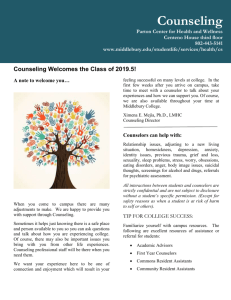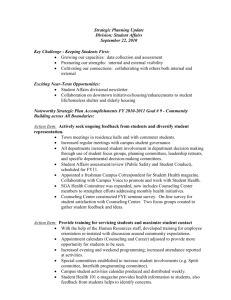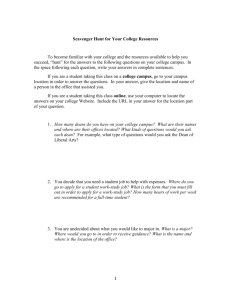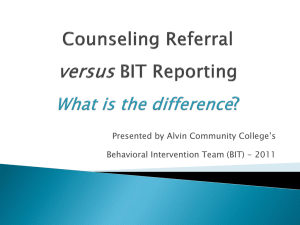Dealing with Distressed or Troubled Students
advertisement
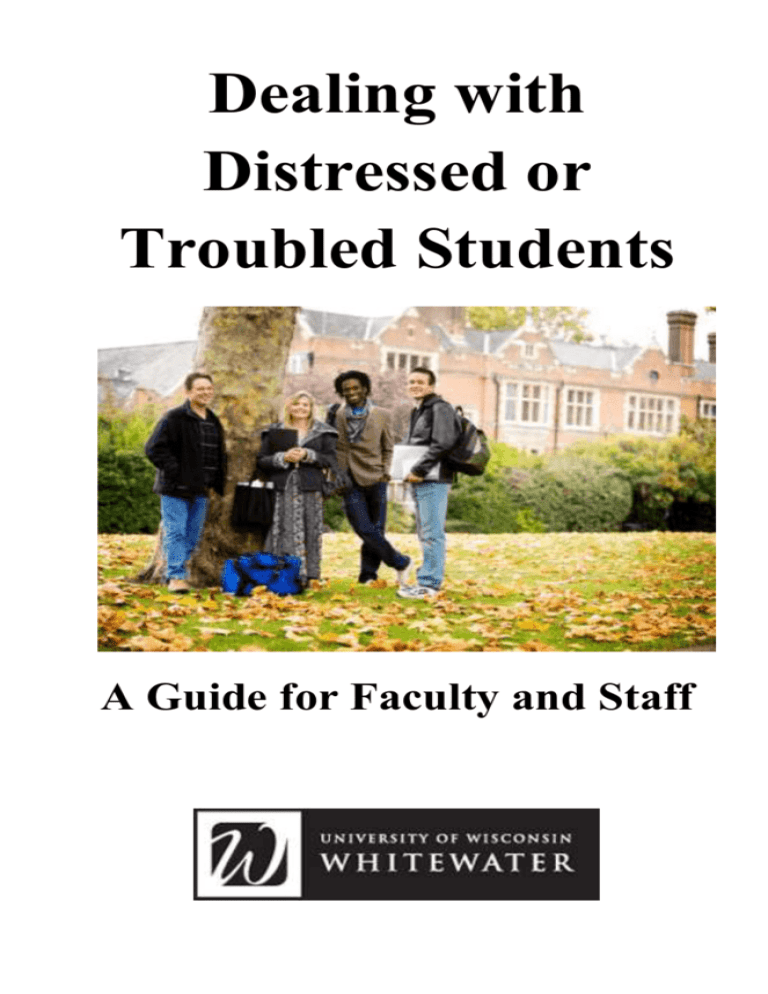
Dealing with Distressed or Troubled Students A Guide for Faculty and Staff As faculty and staff, you come into contact with many students on a daily basis. You are on the “front lines” and thus are in an excellent position to observe students, identify those who may be in emotional distress, and offer assistance. You may be the first (or only) person who recognizes that a student is not functioning well, either academically or personally. What can you do when you suspect a student may need help? How involved should you be? What is your appropriate role? Where do you draw the boundaries? When do you need to consult with someone else? While you are not expected to assess and treat mental health problems, you are in a position to recognize distress or troubling behavior, and may be the best person to direct the student to the most appropriate resource. Reaching out to students is a powerful gesture which not only helps students personally but enhances their academic success. This booklet is designed to acquaint you with the resources on campus that can assist you in helping students in distress and to guide you in making referrals to helping professionals. In addition, there is a section outlining suggestions for dealing with specific types of emotional problems. RESOURCES CARE Team The Campus Assessment, Response and Evaluation Team, known as the CARE Team, is a group of staff members from various departments who meet regularly to assist students experiencing difficulty and to help ensure the safety of our campus. What Does the CARE Team Do? CARE Team members meet on a regular basis to do the following: Review critical campus incidents Develop intervention strategies to assist students in crisis Develop protocols and proactive ways to address recurring student issues Discuss campus trends that may impact student safety, services, programs and general campus life. Make recommendations to campus staff or faculty as appropriate The group places a high priority on balancing a person’s right to privacy with the university's duty to respond to people experiencing difficulty or expressing at-risk behavior. The CARE Team's primary objective is to connect students with the support and resources they need to be healthy and productive members of our campus community. Though the team’s primary focus is assisting students, assistance is provided for faculty and staff members when needed. The CARE Team consists of: Dean of Students CARE Team Case Manager University Health & Counseling Services Director Residence Life Assistant Director University Police Chief Center for Students with Disabilities Director Intercollegiate Athletics Assistant Director Human Resources & Diversity Director For more information about the CARE Team, to ask a question or to express a concern about someone in the campus community, you may contact the Dean of Students Office during regular business hours (7:45am-4:30pm). You may also report a concern about a particular student, faculty or staff member by using the online Warhawk Cares! Report It Form - http://www.uww.edu/dean-ofstudents/careteam/report.html. You are encouraged to contact the team if you are concerned about a student, friend or colleague for any of the following reasons: Dangerous or disruptive behavior Mental health issues (e.g. anxiety, panic, depression or self-injury) Threat or talk of suicide or self-harm Alcohol or drug concerns Medical or health issues Management of loss or grief Assault or sexual assault Detachment from reality Relationship violence Extended class absence or concern that a person is missing Dean of Students Office – (262) 472-1533 The Dean of Students Office serves as the campus "ombuds" or problem solving resource. Common student concerns include class absence, faculty grievance, harassment complaints, medical withdrawal questions and other attendance issues. Assistance is also provided to faculty and staff members related to academic and general misconduct issues, dealing with disruptive behavior, assistance with classroom management and general concerns about student behavior or health. Anti-Hazing Hotline - (262) 472-4293 Anyone may use this 24-hour hotline to report instances of hazing directly to a university staff member. Students may provide identifying information or report concerns anonymously. Center for Students with Disabilities - (262) 472-1305 The Center for Students with Disabilities (CSD) helps students with disabilities obtain equal opportunity to participate fully in all aspects of their educational experience. CSD serves students with a variety of visible and hidden disabilities and can help determine whether a student is eligible for their services. Office of Residence Life - (262) 472-5275 The Residence Life Office has many staff members who can assist in resolving issues related to campus housing. Additionally, each residence hall has live-in staff members who are available to discuss the living environment, conflict with roommates, ways to get involved on campus and a variety of other personal issues. Sexual Assault Survivors Assistance Team - (262) 472-1060 The Sexual Assault Survivors Assistance Team (SASA) is a group of campus staff and students who have been trained to provide resources, information and advocacy for survivors of sexual assault. University Health and Counseling Services (UHCS) Health Center - (262) 472-1300 Counseling Center - (262) 472-1305 The University Health and Counseling Services provides comprehensive, low-cost health services including examinations and treatment for minor illnesses, immunizations, labs, medications, contraceptives, family planning, HIV/STD testing, mental health services and a variety of other services. Mental health services are free of charge for students. Counselors are available for crisis intervention from 8am-4:30pm Monday through Friday. Students may call or walk-in to make a crisis appointment. University Police - (262) 472-4660 The University Police provide law enforcement and educational services on campus. University Police Officers are available 24hours a day to respond to a crime or emergency. Dial 911 if safety is threatened or to report an emergency that needs immediate response. WSG-Sponsored Legal Services - (262) 472-1471 The Whitewater Student Government contracts with a lawyer who provides free legal advice for students. The lawyer is available to meet privately with students to discuss their concerns but will not provide representation. Call Career & Leadership Development at the number listed above or stop in the University Center 146 to schedule an appointment time. Winther Counseling Lab - (262) 472-2842 Winther Counseling Lab provides free, confidential counseling services for UW-Whitewater students and to the public. The Winther Lab is staffed by graduate students in the Counselor Education program who are supervised by licensed Counselor Education faculty members. Winther is open only during the academic year and does not provide emergency services. Local Community Resources 24-Hour Mental Health Crisis Line (800) 365-1587 This mental health crisis line is staffed by Walworth County Human services and is available for a student having a mental health emergency after hours. Students may also contact a residence hall staff member or University Police staff member to assist in an emergency mental health situation. Jefferson County Human Services - (920) 674-3105 Jefferson County Human Services can assist Jefferson County community members with issues related to mental health, substance abuse, family, parenting, hunger and access to statefunded programs. Part of the UW-Whitewater campus is located in Jefferson County. National Suicide Prevention Lifeline - (800) 273-8255 This 24-hour crisis line is free and available to anyone who is in emotional distress or experiencing a suicidal crisis. Your call will be routed to the nearest mental health crisis center to your location. You may contact this number for individual assistance or for a loved one. Walworth County Human Services - 262-741-3200 Walworth Human Services can assist Walworth County community members with issues related to mental health, substance abuse, family, parenting, hunger and access to statefunded programs. Most of the UW-Whitewater campus is located in Walworth County. Whitewater City Police (262) 473-0555 The Whitewater City Police provide law enforcement and safety services for local community members. Any off-campus location is part of the Whitewater City Police’s jurisdiction. Helping Students in Distress: General Guidelines Sometimes it can be difficult to discern the cause of a student’s disruptive behavior. Some disruptive behaviors can stem from emotional or psychological problems, while others may stem from general stress or inability to manage one’s behavior. What to do Reaching out to a student and letting them know you have seen changes in their behavior will have a profound effect on the student. Acknowledge to the student that you notice they are distressed and you are concerned about them. Let them know you are willing to look at options that could help them. Generally, the following steps may be helpful: OBSERVE --- A first important step in assisting a student is to be familiar with the symptoms of distress. Pay close attention to direct communications, as well as implied or hidden feelings. Focus on the observable symptoms and focus on how they are impacting the student’s life. INITIATE CONTACT --- Don’t ignore strange, inappropriate or unusual behavior(s). Talk to the student in question privately, in a direct and matter-of-fact manner, indicating your observations and concerns. Be sure to focus on the symptoms that were displayed and express your concern about how they are impacting the student. Early feedback, intervention and/or referral can prevent more serious problems from developing. OFFER SUPPORT AND ASSISTANCE --- Your interest, attentive listening and concern may be pivotal in helping a troubled student. Avoid criticisms or sounding judgmental. Allow the student time to respond and acknowledge that their perception may be different. Summarize the essence of what the individual has told you as a way of clarifying the situation. Validate feelings while also encouraging positive action by helping the student to define the problems and generate coping strategies. REFER --- Know your limits as a helper and only go as far as your expertise and resources allow. When a student needs more help than you are able or willing to give, a referral is appropriate. You may refer to the Dean of Students Office, the University Health & Counseling Service, the Center for Students with Disabilities or other campus offices. The following may be helpful in making an individual referral to Counseling Services. Talk to the student about the services and procedures of UHCS. An initial appointment can be made in person on the second floor of the Ambrose Health Center or by calling 472-1305. It is important to let the student know that services are confidential and free to enrolled students. It is important to provide the individual with a sense of control about his/her decision to follow your recommendation. In most cases, encouraging the student to initiate his/her own appointment with Counseling Services is preferred. Sometimes, however, offering the use of one’s phone or walking the student over to UHCS may be beneficial, if you sense the student would benefit from the support of you accompanying them. In rare cases, a student may be in an acute crisis in which he/she demonstrates behavior that elicits serious and immediate concern about personal safety (either the student's or your own) or the student's ability to function (impaired reality testing or judgment). In such acute cases, you are urged to make telephone contact with either campus police and/or local law enforcement. If you are unsure if the situation warrants this, a consultation with a counselor or with police services can help determine if emergency treatment is needed. It is important to follow up with a student after you make a referral. This conveys your interest. You can also help reduce the stigma associated with counseling by not avoiding the topic, though such discussions should be held privately. ABOUT CONFIDENTIALITY --- UHCS staff are required by law and professional ethics to protect the confidentiality of all communication between therapist and client (except in cases where harm to self or others is indicated). Consequently, the Counseling Services staff cannot discuss with others the details of a student’s situation, or even indicate whether the student is being seen in therapy without the student’s signed consent. It is suggested that you ask a student directly if s/he followed up on your recommendation to make contact with UHCS. When Counseling May Be Needed Trauma or Crisis in Relationships Break-up or change in relationship status Loss or illness of a family member or close friend Conflict with roommate, friend, or family Victim of assault Unusual Behavior or Marked Change in Behavior listlessness or frequently falling asleep in class Disruptive or threatening behavior in classroom or residence Changes in appearance, including weight and hygiene Extreme mood changes or excessive, inappropriate display of emotion Sudden withdrawal from people or excessive sleep Hyperactivity, chronic irritability, or excessive anxiety Confusion, disorientation, or bizarre behavior Problems with Academic Performance Poor academic performance and preparation, especially if such behavior represents a change from previous functioning Repeated request for special accommodations Test or speech anxiety Confusion over low performance Harmful Statements or Behaviors Overt references to suicide or statements of helplessness or hopelessness Indications of persistent or prolonged unhappiness Extreme risk-taking behavior Substance Abuse Evidence or excessive use of alcohol or other drugs Impaired daily functioning secondary to substance use (e.g.-not attending classes, not going to work) The above list outlines behavioral changes or stressful events in students’ lives which may warrant counseling. The following sections address specific types of emotional concerns you may find when working with students. It is critical to remember that while you may be a key source of support to a student, you cannot be expected to do it all. When you feel particularly concerned about a distressed student, you can refer the student to counseling, contact a member of the CARE Team or consult with staff in the University Counseling Center. The Depressed Student Signs and Symptoms Because we all experience some of the symptoms of depression at one time or another, we all have some personal knowledge of what the depressed student is going through. A depressed student is likely to be experiencing some of the following symptoms: Sadness, tearfulness Guilt or anger at him/herself Trouble concentrating or remembering Loss of interest in schoolwork or usual activities Feelings of worthlessness or inadequacy Physical Symptoms Changes in appetite Difficulty sleeping Low energy level Feelings of hopelessness or helplessness Suicidal thoughts Facts about Suicide It is important to take all suicidal comments seriously and to make appropriate referrals. College students have higher suicide rates than noncollege people of the same age More men commit suicide; more women attempt There are more attempts at the beginning and end of the semesters Talking about suicide will not plant the idea in a person’s mind, but will probably relieve some of the tension s/he is experiencing Feeling isolated increases the likelihood of suicide The more developed the suicide plan, the greater likelihood for suicide Helpful Responses: Reach out more than halfway and encourage the student to talk about his/her feelings Tell the student about your concern for his/her wellbeing Talk about suicide if that is on the student’s mind Refer if suicidal (UHCS 472-1305, University Police 472-4660, or 911) Frequent contact, even for a few minutes, begins to relieve feelings of isolation (encourage the student to be in contact with family, friends, counselor) Less Helpful Responses: Saying “don’t worry,” or “everything will be better tomorrow.” This may only make the student feel worse Becoming overwhelmed by the student’s problems. This may only provide evidence that s/he should feel helpless Assuming too much responsibility for the student and his/her problems Trying to ignore or minimize his/her feelings The Student in Poor Reality Contact This student may have trouble distinguishing fantasy from reality. To some extent, the person will appear confused or illogical. You may notice that the student’s speech jumps from one topic to another with little or no logical connection between topics. This student may also pay a great deal of attention to some unimportant detail that is being discussed or may be generally scattered and incoherent. This student may coin new words and expect others to understand their meaning or may put works together because they rhyme, not because they make grammatical sense. The student may make inappropriate emotional responses. For example, s/he may overreact to his/her feelings, or be very “flat” emotionally. Many times the person knows that his/her emotions are inappropriate, but just feels overwhelmed and cannot control them. Someone in poor contact with reality may experience themselves as especially powerful or important or may believe that people are attempting to harm or control them in some way. S/he may also feel that certain actions have special meaning for them (e.g.- when people in a small group begin to laugh, then they are laughing at him/her.) This student may experience hallucinations, usually auditory, although the hallucination can be experienced through any sense. Helpful Responses: Respond to them with warmth and kindness, but with firmness If you are comfortable in doing so, remove extra stimulation from the environment and see them in a quiet atmosphere Recognize their concerns and state that you can see they need help Acknowledge their feelings or fears without supporting the misperceptions (e.g.- “I understand how you think they are tying to hurt you and I know how real it seems to you, but I don’t hear the voices.”) Reveal your difficulty in understanding them (“I’m sorry, but I don’t understand. Could you repeat that or say it in a different way?”) Less Helpful Responses: Arguing, disputing their illusions, or trying to convince them of the irrationality of their thinking. It just makes them defend their position (false perceptions) more Playing along (e.g.- “Oh yeah, I hear voices..see the devil!”) Encouraging further revelations of delusional thinking. It would be more helpful to switch topics and divert focus from delusions to reality Demanding, commanding, or ordering them to do something or change themselves The Aggressive Student Aggression can take many forms, from very subtle, passive acts to violent outbursts. It often results when a student perceives a threat, feels frustrated and/or out of control. Some aggressive people express hostility immediately without regard for their circumstances or the people around them. Others deny their anger and frustration until their hostility builds to the point of an explosive outburst. Many time, persons who are verbally or physically aggressive feel inadequate and use hostile behavior as a way to build up their self-esteem. Often these individuals believe you will reject them so they become hostile and reject you first to protect themselves from being hurt. They may see you as attempting to control them and lash out to try to gain some sense of control. It is important to remember that the student is generally not angry at you personally, but is angry at his/her world and you are the handy target of pent-up frustrations. Overall, dealing with an aggressive student will be handled best by maintaining a firm, consistent and calm control in the situation (i.e. know what you are doing and what your goals are). Helpful responses: Allow the individual to express his/her anger, and tell you what is upsetting. Tell the student that you are not willing to accept abusive behavior (e.g. “When you yell at me I cannot listen.”) If you need to, explicitly state what behaviors are acceptable. Stick to the limits you set. If the person begins to get too close to you, tell them to please move back. Reduce stimulation. If you are comfortable doing so, invite them to your office or another quiet place. If you sense a threat, arrange for a colleague to be nearby. Rephrase what the individual is saying and identify his/her emotions. Get help if necessary (supervisor, colleague, police). Less Helpful Responses: Arguing Pressing for explanations about his/her behavior Looking away and not dealing with the situation Physically restraining or grabbing the student Making threats, dares or taunts The Anxious Student We have all experienced anxiety in response to a perceived stressful situation. Anxiety becomes heightened as the situation becomes more vague and less familiar. A panic attack is an overwhelming sense of dread and fear, and is the extreme result of feeling anxious. Some of the physiological components of general anxiety and panic attacks are rapid heart palpitations, chest pain or discomfort, choking, dizziness, sweating, trembling or shaking, or cold, clammy hands. The student may experience feelings of worry or fear and may anticipate some misfortune. S/he may complain of poor concentration, being on edge, being easily distracted, memory problems, and/or fitful sleep. The student may also state unreasonably high self-expectations, and be very critical of his/her present performance. This student may constantly think about and discuss his/her problems and possible solutions, but be too fearful to take action. Helpful Responses: Let them discuss their feelings and their thoughts. Help them, if possible, to define their stressors and their ineffective and effective coping strategies. Encourage them to break down tasks into workable steps so as to feel less overwhelmed. Relaxation techniques, deep breathing, meditation, and enjoyable exercise (e.g. walking) can all be helpful in reducing anxiety. Encourage them to engage in these behaviors or to seek professional help to learn these and other coping strategies. Be clear and explicit about what you are expecting from them, and what you are willing to do. It may be helpful to have them repeat what you have said to ensure that they understand. Less Helpful Responses: Taking responsibility for his/her emotional state. Trying to solve his/her problems as if they were your own. Becoming anxious or overwhelmed along with them. The Demanding Student Any amount of time and energy may simply not be enough for some students. Such students often seek to control your time and unconsciously believe that the amount of time received is a reflection of personal worth. In many instances, these people feel incompetent to handle their own lives. Helpful Responses: Set clear and precise limits with the student. Stick to limits no matter how much s/he protests. Let the individual make his/her own choices, clarifying the logical consequences of such choices. Refer the student to other students in class, their friends, or campus/community resources. Less Helpful Responses: Taking responsibility for the individual. Letting the student “trap” you into solving more and more of his/her life problems. Allowing him/her use you as a sole source of support The Suspicious Student Usually these students complain about something other than their psychological difficulties. They are tense, cautious, mistrustful, and have few friends. These students tend to interpret a minor oversight as significant personal rejection and often overreact to insignificant occurrences. They see themselves as the focal point of others’ behavior and everything that happens may seem to be interpreted in a suspicious light. Usually they are over-concerned with fairness and being treated equally. They project blame onto to others and will express anger in indirect ways. Many times they will feel worthless and inadequate. Helpful Responses: It is important to send clear, consistent messages regarding what you are willing to do and what you expect. Express “reserved compassion,” mindful that a suspicious student may have trouble with closeness and warmth. Less Helpful Responses: Being overly warm or nurturing or assuring the person that you are his/her friend. Let the student know that you can still be concerned without being intimate. Trying to flatter him/her or to be cute or humorous to try to relieve your own anxiety. This will probably distance the student from you. General Tips for Dealing with Troubled Students Request to see the student outside of class. Briefly describe your observations and perceptions of their situation and express your concerns directly and honestly. Listen carefully to what the student is troubled about and try to see the issue from their point of view without necessarily agreeing or disagreeing. Strange and inappropriate behavior should not be ignored. The student can be informed that such behavior is distracting and inappropriate. Your receptivity to an alienated student will allow them to respond more effectively to your concerns. Involve yourself only as far as you are willing to go. At times, in an attempt to reach or help a troubled student, you may become more involved than your time or training permits. Extending oneself to others always involves some risk, but it can be a gratifying experience when kept within realistic limits. If you have concerns about a student’s emotional state, call University Health and Counseling Services (262) 472-1305 for consultation. If you have concerns about a student’s disruptive behavior or discipline concerns, contact the Dean of Students Office (262) 472-1533. If the situation is an emergency and anyone’s safety is in danger, call 911 immediately. For non-emergency situations, you may call University Police Services (262) 472-1060. If you believe a student may need a coordinated response, or you don’t know how to proceed, contact anyone on the CARE Team. Helpful Resources: Any emergency 911 UWW CARE Team (Dean of Students Office) 472-1533 UWW Counseling Services 472-1305 UWW Health Services 472-1300 UWW Residence life 472-4255 UWW Police (non-emergency) 472-4660 UWW Sexual Assault Response Team 472-1060 City of Whitewater Police (non-emergency) 473-0555 Walworth County Crisis Hotline 1-800-365-1587 Aurora Lakeland emergency Department 262-741-2000 Fort Atkinson Memorial Hospital Emergency Department 920-568-5330 This document was adapted with permission from the University of Maine Counseling Center.
